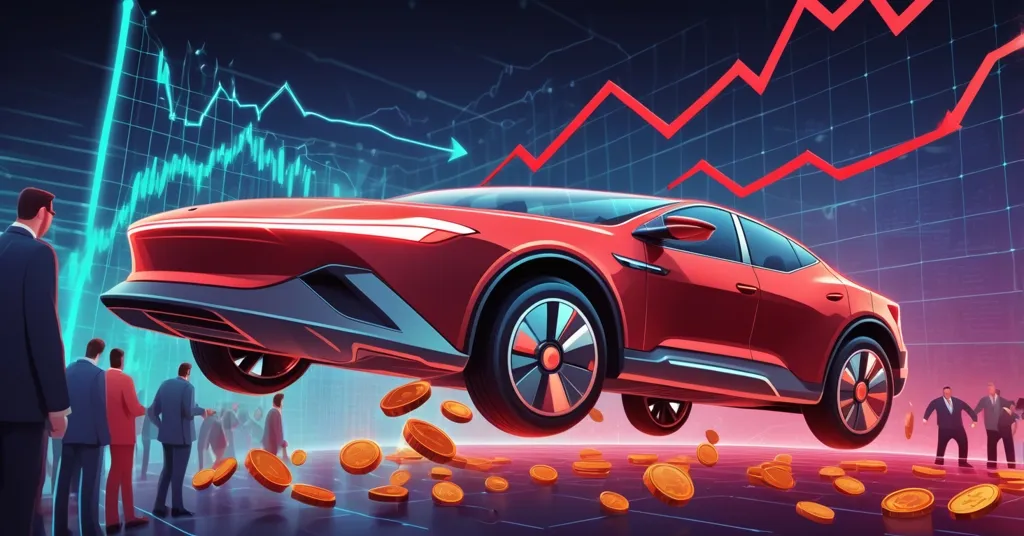Tesla Stock Crash: Retail Traders Pour $201M Amid Musk-Trump Feud, Bitcoin Parallels Emerge

Retail Traders Dump $201.3M into Tesla Amid Musk-Trump Drama: Bitcoin Parallels Unfold
Tesla’s stock took a brutal 14.3% hit on Thursday, one of its worst days since hitting the public markets in 2010, after a fiery public clash between Elon Musk and US President Donald Trump. Retail traders, unfazed by the chaos, poured a staggering $201.3 million into Tesla shares, driving $2.6 billion in trading volume. While Wall Street reeled, the “buy the dip” frenzy echoed the same raw energy we see in Bitcoin and crypto markets during a crash.
- Stock Plummet: Tesla shares dropped 14.3% due to Musk criticizing Trump’s tax-cut bill, with Trump threatening to axe federal contracts.
- Retail Surge: Traders invested $201.3 million, making Tesla the second-most bought stock by retail investors that day.
- Crypto Mirror: The retail “buy the dip” mindset mirrors Bitcoin trading behavior during volatile dips.
Tesla’s Stock Nosedive: Breaking Down the Numbers
The drama kicked off when Elon Musk, never one to mince words, slammed Trump’s proposed tax-cut legislation. Trump hit back hard, threatening to cancel federal contracts tied to Musk’s empire, including Tesla and SpaceX. The market didn’t take it lightly—Tesla’s stock cratered 14.3% on Thursday, marking its 11th worst single-day loss since its 2010 IPO. This came after a wild ride: a 90% surge in the six weeks post-Trump’s election win on November 5, followed by a 37% slide from its December 17 peak. By Friday, the stock clawed back some ground, rising 5.6% to $299.14, though it’s unclear how much of that bounce came from retail buying.
Retail traders, often the underdogs of the market, saw blood in the water and dove in. Their $201.3 million investment fueled a massive $2.6 billion trading volume, ranking Tesla as the second-most purchased stock among individual investors that day. Beyond direct shares, they also funneled $41.5 million into the Direxion Daily 2x Bull ETF (TSLL.O), a leveraged fund that doubles down on Tesla’s daily performance using borrowed money—think of it as margin trading in crypto, but for stocks. High risk, high reward, and very familiar to anyone who’s played with Bitcoin futures during a dip.
Even the options market, which often signals investor panic, didn’t implode. Tesla’s 30-day implied volatility—a measure of expected price swings based on options pricing—hit 77 on Thursday, the highest in six weeks, before cooling to 68 by Friday. For perspective, that’s tame compared to the 106.1 peak during April’s broader market crash. Chris Murphy, Co-Head of Derivatives Strategy at Susquehanna International Group, kept it real:
“We’re not seeing a huge move in volatility.”
Traders selling put options, essentially betting the stock wouldn’t tank further, showed a confidence reminiscent of Bitcoin hodlers sitting tight through a 30% crash, waiting for the inevitable rebound. This kind of market behavior draws stark parallels between Tesla’s stock crash and Bitcoin’s market volatility.
Retail Traders: Heroes, Gamblers, or Both?
Let’s talk about the retail crowd. These aren’t hedge fund suits with algorithms—they’re everyday folks, often guided by gut, grit, and groupthink on platforms like Reddit and X. Marco Iachini, Senior Vice President of Research at Vanda Research, summed up their vibe:
“Tesla has been a favorite holding for this group for a while, so when they see a drop of 14% or more, they jump in and buy.”
Their “snatch the low” mentality was loud and clear across social media, with Iachini noting the dominant sentiment as “buy the dip.” If that sounds like a page from the Bitcoin playbook, it’s because it is. Whether it’s Tesla shares or BTC, retail investors thrive on chaos, fueled by FOMO and a belief that today’s crash is tomorrow’s jackpot. Think back to Bitcoin’s 2021 tumble after China’s mining ban or the 2022 bear market—X was flooded with “stack sats now” posts, mirroring the Tesla hype on Reddit discussions about buying Tesla dips.
But let’s not romanticize it. Is this heroism or just gambling with extra steps? Retail traders piling into leveraged ETFs or crypto futures often get burned when the rebound doesn’t come. The psychology—hype, loyalty, and a dash of rebellion against “the system”—binds Tesla and Bitcoin fans, but it’s a double-edged sword. Diamond hands can turn to paper hands real quick when the market doesn’t play ball, as seen in trends of retail investors buying dips in both Tesla and Bitcoin.
Crypto Parallels: Same Chaos, Different Arena
If Tesla’s rollercoaster feels like déjà vu, that’s because Bitcoin volatility laughs at the word “stable.” Both assets get slammed by external shocks—political feuds for Tesla, regulatory bombs for Bitcoin—yet retail players in each space keep betting on the long haul. Tesla’s implied volatility spiking to 77? Cute. Bitcoin’s price swings in 2017 or 2021 made 30% drops look like a warm-up. And just like crypto traders leveraging up on Binance during a crash, Tesla investors dumping cash into 2x ETFs show the same daredevil streak.
The overlap isn’t just numbers—it’s culture. Social media drives both crowds, whether it’s Reddit apes hyping Tesla or Telegram groups shilling altcoins. The “pile in on the crash” mindset isn’t rational; it’s tribal. Steve Sosnick from Interactive Brokers offered a sober take:
“I don’t think we’re at the real warning sign levels at the moment.”
Fair point, but in both Tesla’s orbit and Bitcoin’s ecosystem, volatility isn’t a glitch—it’s the game. Price swings shake out the weak while rewarding the stubborn, whether you’re hoarding shares or stacking sats. This dynamic is often fueled by high-profile figures and events, such as the Elon Musk and Donald Trump feud impacting Tesla trading behavior.
Musk and Crypto: A Rocky Romance
Elon Musk isn’t just Tesla’s CEO—he’s a crypto market mover who can spike Dogecoin with a tweet or crash Bitcoin with a policy flip. Remember 2021? Tesla scooped up $1.5 billion in Bitcoin, briefly accepted it for car payments, then suspended it over “environmental concerns.” By 2022, they’d sold 75% of their holdings for liquidity, leaving hodlers scratching their heads. Musk’s love for decentralization seems more opportunistic than principled, often tied to PR stunts or market pumps, as explored in discussions about Musk’s involvement with Tesla and cryptocurrency.
So, could this Trump spat push him back toward crypto? Maybe. Facing centralized threats like federal contract cancellations might make blockchain’s promise—financial sovereignty, no middlemen—look damn appealing. Imagine Tesla tokenizing assets or revisiting Bitcoin as a hedge against government overreach. It’s speculative, sure, but Musk thrives on bold moves. Still, let’s not kid ourselves: he’s flipped on crypto before. This could just be another headline grab, not a true pivot, especially given the market sentiment shifts tied to Musk’s Bitcoin and Dogecoin endorsements.
Decentralization’s Case Gets Louder
Trump’s contract threats are textbook centralized bullying—the kind of nonsense Bitcoin was built to dodge. Governments meddling in markets? Tell us something new. Whether it’s blacklisting innovators like Musk or banning miners as China did in 2021, the message is clear: centralized power hates disruption. Tesla’s drama, compounded by Musk’s public feud with Trump, is a neon sign for why decentralized finance matters. Blockchain isn’t just about dodging fiat inflation; it’s about systems that can’t be derailed by a politician’s ego trip.
But here’s the flip side: decentralization isn’t a magic bullet. Musk’s companies still rely on government contracts and infrastructure—SpaceX doesn’t launch without federal bucks. And in crypto, regulatory crackdowns keep exchanges on edge. If Musk ever doubles down on blockchain—say, by pushing Tesla back into Bitcoin—he’d have retail believers ready to rally. Until then, centralized clowns will keep clowning, but Bitcoin’s promise shines brighter with every overreach. This tension is underscored by ongoing controversies surrounding Tesla and Musk’s leadership.
Key Takeaways and Questions for Crypto Enthusiasts
- How does retail behavior in Tesla’s stock crash reflect crypto market trends?
The $201.3 million retail surge into Tesla during a 14.3% drop mirrors how Bitcoin traders stack coins during price corrections, driven by community hype on platforms like X and Reddit. - Could Musk’s feud with Trump sway his crypto or decentralization stance?
While not guaranteed, centralized threats like contract cancellations could push Musk toward blockchain advocacy or renewed Bitcoin integration as a counter to government pressure. - What can Tesla’s volatility teach us about Bitcoin’s price swings?
Both Tesla and Bitcoin face external triggers—political drama or regulatory news—yet retail investors remain bullish, betting on long-term growth despite short-term pain. - Is there a real chance Tesla revisits Bitcoin amid this chaos?
Tesla’s past $1.5 billion Bitcoin buy and Musk’s crypto influence suggest potential, though his inconsistency means it’s more likely a PR move than a deep commitment. - Why does Trump’s overreach underline the need for decentralized systems?
Threats to Musk’s companies expose centralized control’s risks, reinforcing why Bitcoin and blockchain are vital for financial independence and resilience against political interference.



